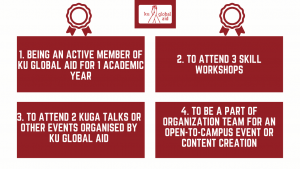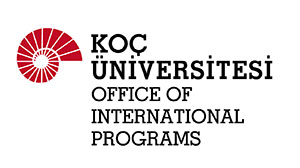May 7, 2021
Transforming from Global Learning and Leadership Program (GLLP) to Global Learning and Leadership for Sustainability (GLLS)
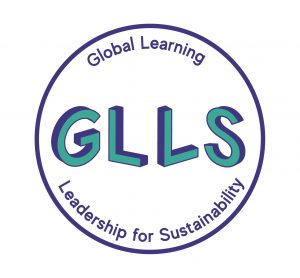
Starting from the Spring 2021 semester, Global Learning and Leadership Program (GLLP) is shifted to Global Learning and Leadership for Sustainability (GLLS) where the sustainability element is heavily highlighted throughout the program including courses, student projects, and other components of the track program. All mandatory and elective courses in GLLS program are the elective courses driven from Sustainability and Impact Management track program offered by CASE Faculty. With GLLS, the student projects are now more focused on United Nations’ Sustainable Development Goals (SDGs) in terms of projects’ creation and communication. Moreover, other components of the GLLS program, such as off-campus events and international learning experiences, are selected according to their relationship with SDGs.
The structure of the program has also changed. While the previous GLLP program had three stages (Fellow, Changemaker, Pioneer), the newly relaunched GLLS program has two stages (Fellow, Advanced). To highlight the importance of global learning, strengthen international participation and encourage students to get involved with the global programs and events; mandatory international learning experience requirements were added to the Fellow stage. Details of the new outline of GLLS can be found here.
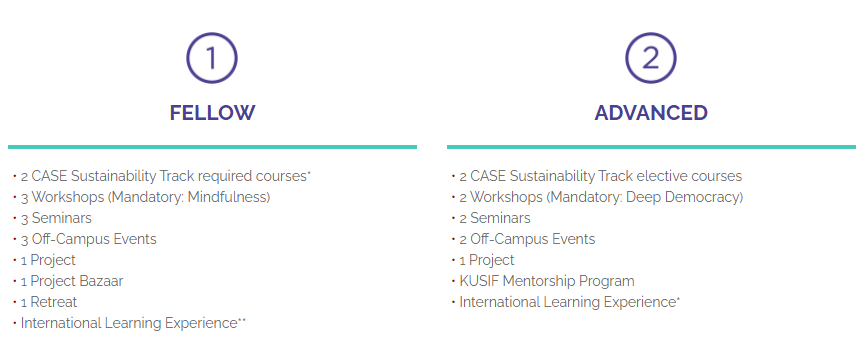
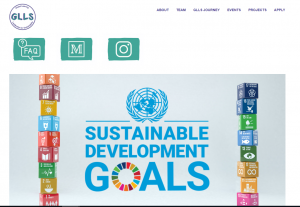
GLLS welcomed 35 new students in Spring 2021 and currently has 86 active fellows & 54 alumni. The GLLS and its alumni community have been growing strongly, and in order to maintain this strong connection, GLLS launched its Linkedin page in Spring 2021. The website of GLLS was also relaunched by highlighting the SDGs, GLLS student projects, GLLS Medium, and Instagram page, as well as FAQ sheet for prospective students.
New Projects from UIF 2020 Cohort
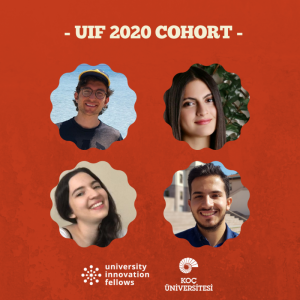 The University Innovation Fellows (UIF) program empowers students around the world to become agents of change in higher education. To create an innovation culture at Koç University and increase the recognition of UIF, UIF students are expected to create campus-wide projects to increase the quality of learning experiences and the facilities. In that regard, UIF Cohorts organize various activities under different projects, collaborating with a number of internal stakeholders for Koc University students. 2020 UIF Cohort started to implement two projects collaborating with the Dean of Students, IT Department, KWORKS and KUSIF. The 2020 UIF Cohort’s projects are confirmed by the school management and the necessary infrastructures for the projects are in progress.
The University Innovation Fellows (UIF) program empowers students around the world to become agents of change in higher education. To create an innovation culture at Koç University and increase the recognition of UIF, UIF students are expected to create campus-wide projects to increase the quality of learning experiences and the facilities. In that regard, UIF Cohorts organize various activities under different projects, collaborating with a number of internal stakeholders for Koc University students. 2020 UIF Cohort started to implement two projects collaborating with the Dean of Students, IT Department, KWORKS and KUSIF. The 2020 UIF Cohort’s projects are confirmed by the school management and the necessary infrastructures for the projects are in progress.
KULENDAR: KULENDAR is a calendar portal where all events at KU along with class times, deadlines, and exams can be seen. The main objective of the project is to enable KU students to better plan and manage their time. The project was approved by the IT Directorate at KU and it is in the application process.
Innovation & Entrepreneurship Online Manual: The Project aims to create a manual that improves upon the landscape canvas students prepared to contain information on entrepreneurship and innovation-related coursework, departments, incubation centers and the paths and counseling KU students can take. The main objective of the Project is to inform students about the Innovation & Entrepreneurship opportunities at Koc University. The project is currently under the process of software development.
KU Global Aid Increases the Awareness on Social Benefit Creation with KUGA Talks and Coexistence Panel


In Fall 2020, KUGlobalAid (KUGA) welcomed its 25 new members which sum up to 38 active members as of today. Starting from Fall 2020, KUGA students launched a campus-wide seminar series called ‘KUGA Talks’, and they have organized four KUGA Talks in Fall 2020 and one KUGA Talks in Spring 2021 so far. Founders and representatives from various social enterprises and NGOs were invited to KUGA Talks. Five KUGA Talks reached a total of 187 KU students.
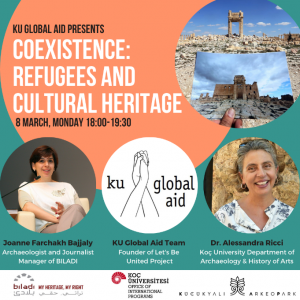
KUGA organized “Coexistence: Refugees and Cultural Heritage Panel” with guests Joanne Farchakh Bajjaly and Alessandra Ricci on March 8, 2021. The event covered the following topics: What is the role of arts, archaeology and cultural heritage in fostering cultural pluralism? Could you or our community benefit from a partnership with archaeologists? How does heritage relate to Syrian refugees in Türkiye and Lebanon? This campus-wide and open-to-public event was announced to various research institutions and universities, and hosted listeners from different countries as well.
In Fall 2020, KUGA launched their Linkedin page which is used to create a network in KUGA community, create visibility of KUGA events and Medium posts and create a stronger network with NGOs and social entrepreneurs via the Linkedin platform.
New Era of KUGA: Participation Certificate
KU Global Aid is an international service-learning program, with the main motivation to create social impact using the tools of social entrepreneurship, human-centered design, and sustainable building in line with the necessities of the 21st century. In Fall 2020, OIP started to implement a skill training program for KUGA students to develop their 21st century skills and to offer a better-quality KUGA experience. The training is given by the expert instructors under the supervision of OIP to develop students’ skills in teamwork, communication, leadership, decision making, and problem-solving.
Requirements for KUGA Participation Certificate
- Being an active member of KU Global Aid for 1 academic year
- To attend three skill workshops
- To attend 2 KUGA Talks or other events organized by KU Global Aid
- To be part of organization team for an event organization or content creation
Details of the KUGA Participation Certificate requirements can be found here.
